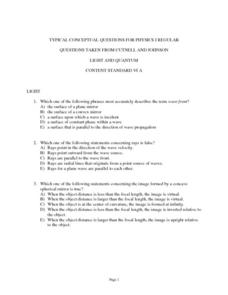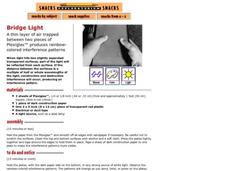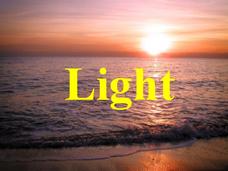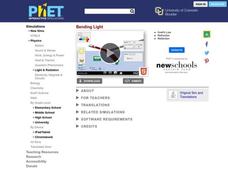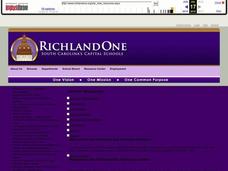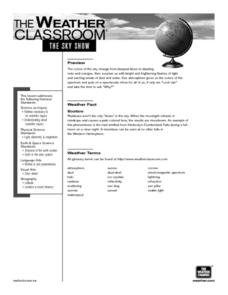Curated OER
Light 2: The Lighter Side of Color
Students explore light and color, including how colors are mixed to produce new colors, how light is filtered, and how light is reflected off of surfaces.
Curated OER
Typical Conceptual Questions for Physics I - Light and Quantum
This is a stellar overview of everything light and quantum! There are 30 multiple choice questions, none of them requiring any mathematical computation. There are a few diagrams to analyze: light rays striking reflective and refractive...
Curated OER
How Do You Light Up Your World?
A tremendous presentation on the properties of light. Young scientists are treated to slides which share a lot of fascinating information about light. This impressive PowerPoint is filled with great photos, graphics, and discussion...
Exploratorium
Bridge Light
An illuminating activity demonstrates how interference of light waves creates a pattern. Using Plexiglas™ and construction paper, participants see rainbows appear as they twist or press against the plastic plates. After the activity, you...
Curated OER
Colors, Colors Everywhere
Students mix red, yellow, and blue frosting together to produce secondary colors. Pupils are shown that all colors are made from mixing primary colors of paint together. They discuss the color wheel and spread the "paint" icing on...
Curated OER
Light
Here is a stellar slide show for illuminating middle schoolers' minds on the topic of light! An interactive slide allows viewers to sort light sources by whether or not they are man-made. More objects are displayed and learners discover...
PHET
Bending Light
Different colors of the spectrum travel at different speeds through media, causing them to refract at different angles—which allows humans to see their colors. Through a simulation, pupils see how air, water, and other media bend light....
Curated OER
Let There Be Light!
Fourth graders conduct experiments involving reflected light, absorption of light, refracted light, and colors absorbed by light. For this light lesson plan, 4th graders write about the results of their experiments as well.
Scholastic
Study Jams! Light
Let there be light in your classroom with a video that explains that light travels in waves, the electromagnetic spectrum contains seven colors, and the color of an object depends on which light waves it reflects and absorbs. With...
American Museum of Natural History
See the Light
It's time to see the light! Scholars perform three different experiments with light to reveal properties using a great remote learning resource. The pupils see how light reflects from a surface and refracts through different materials....
California Institute of Technology
Physics of Light
Gummy bears are tasty, but did you know they are also used to determine color and light properties? Use the activity as a way to demonstrate light absorption, light reflection, and refraction with high schooler. Pupils conduct small...
Curated OER
Light
Light is such a fascinating subject. This instructional activity does a great job of illuminating the mysteries of light for your young scientists. A series of demonstrations which are explained in the plan should help your charges to...
Curated OER
Light 3: All Those Seeing Color, Say Eye!
Middle schoolers explore the nature of light. They use on-line articles and a worksheet to explore the roles of the eye and brain in the perception of color. They draw and label a diagram illustrating the movement of light.
Huntington Library
Light in Painting
How do painters use and manipulate light in their artwork to give emphasis and establish mood and emotion? Pupils will analyze a few examples of landscape and portrait painting in order to explore the how light is used in art, and will...
Curated OER
See the light
How do light and eyesight function? Read a brief passage explaining the phenomena of light and sight. Then have learners draw arrows showing how a boy in a room with a lamp would be able to see a chair. A mini-experiment suggestion is...
Curated OER
Refraction B2—When is Light Reflected Internally?
Physics is phun in this lesson. Young physicists use a lightbox to test how and where light is refracted and reflected as it travels through transparent materials. Angles of incidence and refraction, sine of both angles, and the ratio...
Curated OER
Light and Optics
Third graders utilize the scientific method to explain light and optics in this five lessons unit. Through experimentation and discussion, 3rd graders canvass the concepts of light traveling, reflection and refraction.
Curated OER
Sky Show
Students participate in a discussion of the sky and colors. They watch a demonstration of how colors can change. They examine the issue of if weather should be a part of their coursework.
Curated OER
Mixing Colors
Students understand why we see various colors. In this mixing colors lesson, students experiment with different food coloring to explore how colors are made. Students record on a data sheet the colors they see.
North Birmingham Academy
Color Theory
What better way to learn about colors than by coloring? Starting with the primary colors, young artists follow written prompts to shade in various rectangles and a color wheel to show complementary colors, tints and shades, and more.
Curated OER
The Color of Light
Young scholars explore the components of light as a combination of several colors. The focus of the lesson plan reveals that objects are viewed in a certain color because that color is reflected off of the object.
Curated OER
Light
In this light worksheet, students read what makes light, the speed of light, and the electromagnetic spectrum. Students complete 12 matching, 8 fill in the blank, and 9 word problems.
Curated OER
Light
In this light activity, students match 12 terms related to light and the electromagnetic spectrum to their definitions, they order waves by their speed, they analyze the energy and wavelengths of the electromagnetic spectrum and they...
Curated OER
Reflection, Refraction & Lenses
Students are able to describe what happens to light when it strikes different materials. They describe the law of reflection. Students are able to explain why a mirror froms a virtual image. They are able to describe diffuse reflection.



